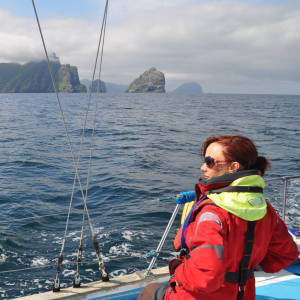One hell of a place!
Anchorage: Isle of Canna.
After the recent soggy weather we were happy to wake up to blue skies and no wind :D We set sail from Plockton and headed south towards the Skye bridge and Kyle Rhea. Gorgeous. And we got fabulous veiws of harbour porpoise in flat calm water.
We continued down the sound of sleat and out towards the stunning Isle of Canna! We were joined by a couple of Minkes but that was by no means the highlght of my day.
The photo i chose was one of many taken of a stunning evening in a stunning place. The evening sun looked incredible on the mountains of the Isle of Rum and this bay set them of wonderfully. Edd, Connor, Kate, Robert and I went ashore, bought a bear from the quirky and very cute Cafe Canna and took a stroll along the island. I've gotta say, that this was an evening that I will not forget in a long time. Heaven on earth.
Whilst we were walking Liz took charge of the blog and i thought it was highly important that I share what she had to say:
'
When you leave land and step aboard a research vessel you enter a different world. Many familiar things seem different. The toilets are the heads, the kitchen is the galley, the driver is the skipper and the biologist is the Science officer. Your cabin is your room and the journey is the effort. Our effort has been dedicated. So far this week we have already experienced high and low pressure, strong winds and driving rain.
And the cetaceans, still the cetaceans drive us forwards. The mast is the focal viewpoint and our eyes are turned toward the horizon. When you step aboard there is much to be learned. identifying cetaceans, how to work the heads, what makes the cooker tick. I've already learned many of those things but then I learned something far more important.
Standing on the deck tied in, facing into the wind, I'm learning to contemplate the fate of the cetacean. We've had our identification lessons and tested our eyes, our ability to recognise them. On the mast, it's not about those scientific skills, it's a lesson in the lifestyle of a porpoise or a whale. The water stretches ahead, inhibiting the landlubbers aboard. When I sight a head or a fin or a splash all I can do is look for a bit more creature to confirm my initial report.
The creature can dip down under the waves, swerve and turn into the tide, ride the swell. All I can do is wonder where it went and hope it will reappear again yet briefly. The creature has the upper hand. But then I find myself so much more aware of how precariously it lives. We've been learning the history of British waters and the whale. When I was a child the basking shark was regularly seen in the area I grew up and today the whale population seems healthy but around here in The Hebrides and Western Isles there were once far more animals.Their distribution is recorded in the Whaling industry archives. A helpful record that indicates the significant deline since the nineteen-hundreds. Two species have disappeared in this area since the seventeen-hundreds.
People have memories of cetaceans along the shoreline and there are stories to be told. Today though we accept that these animals are scarce and hard to witness. The contrast between those childhood stories and the current picture frightens me.
The cetacean may be disappearing.
In the future, I'm learning that our own stories of current scarcer numbers will be hard to contemplate for those who will never have seen one.
I came to the Hebrides hoping to see an Orca. I've learned that the 'resident' group only has seven members and they haven't reproduced in living memory. They've been sighted for around thirty years and had adults in the group from the beginning of recordings. If they haven't reproduced in living memory this group is doomed.
They may be an iconic creature for us, they may grow to 9.8m long but they may be something no longer seen in this part of the world fairly soon.
I came hoping to see one, like every other casual observer, hopeful, selfish and optimistic but since arriving I now fear NOT seeing one. An orca was stranded a couple of days ago at Malin Head. It may have been one of the seven. One text book suggests a normal family group can number between three and twenty five. Our precious seven, isolated here in these Celtic waters, seem so very fragile now. When they are gone, that family, specific to this area, likely to have it's own acoustic repetoire and genetic characteristics, will no longer exist.
I dread not seeeing them.
Not because I cannot return to keep searching but because time is running out.
Today we travelled through the beauty of the channel that separates Skye from the Scottish mainland. We were witness to stiller waters and some more rain. The wind had abated and the seal, harbour porpoise and minke whale populations were active. Yet every member of the team had sighting-less periods at the mast. Each time there is no sighting, I begin to wonder if the cetacean population message will ever be heard.'
- 2
- 1
- Nikon D3200
- 1/30
- f/4.0
- 31mm
- 200

Comments
Sign in or get an account to comment.


